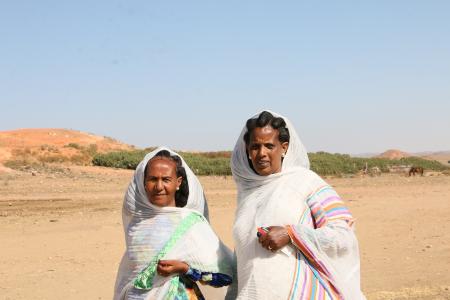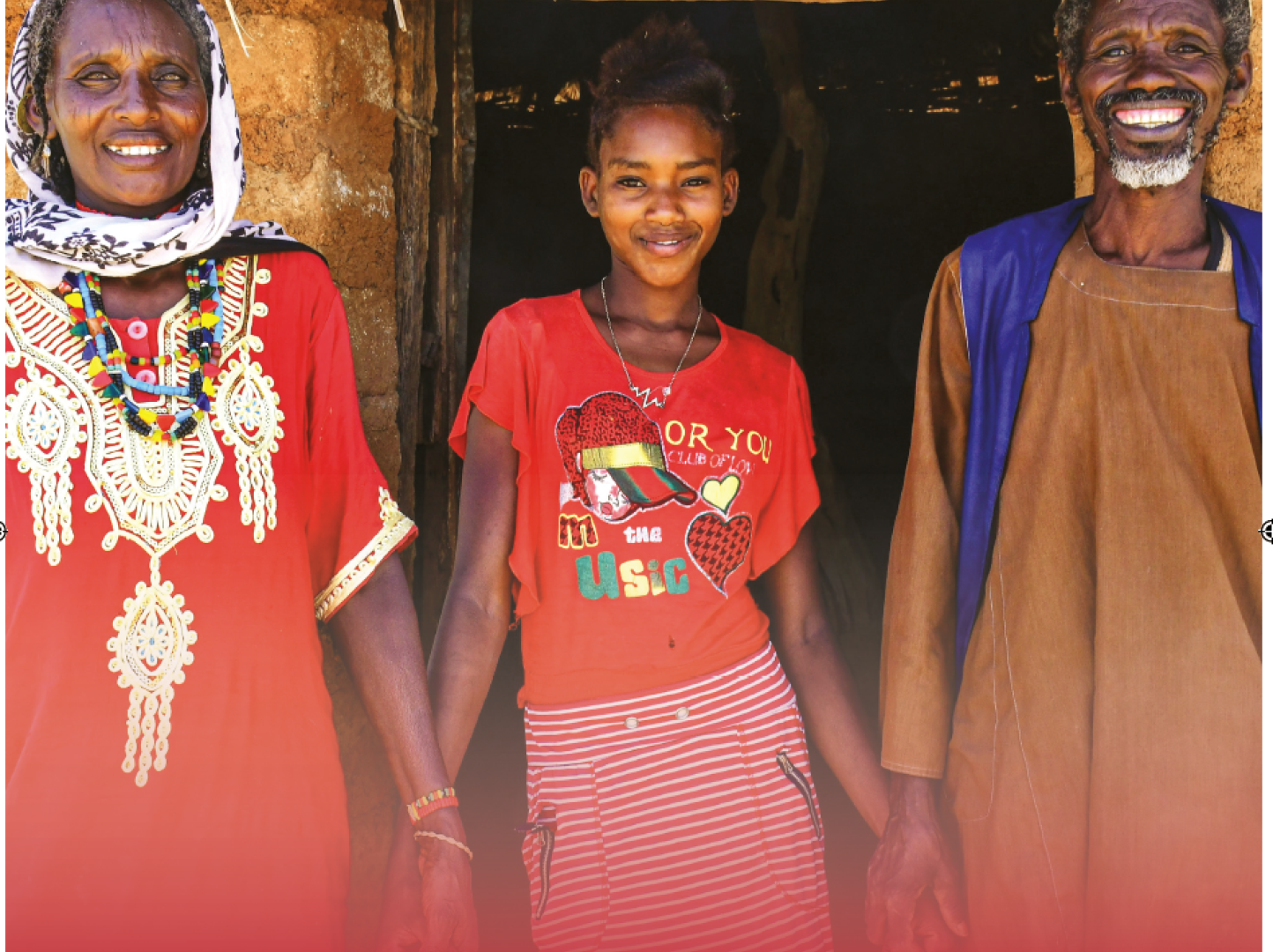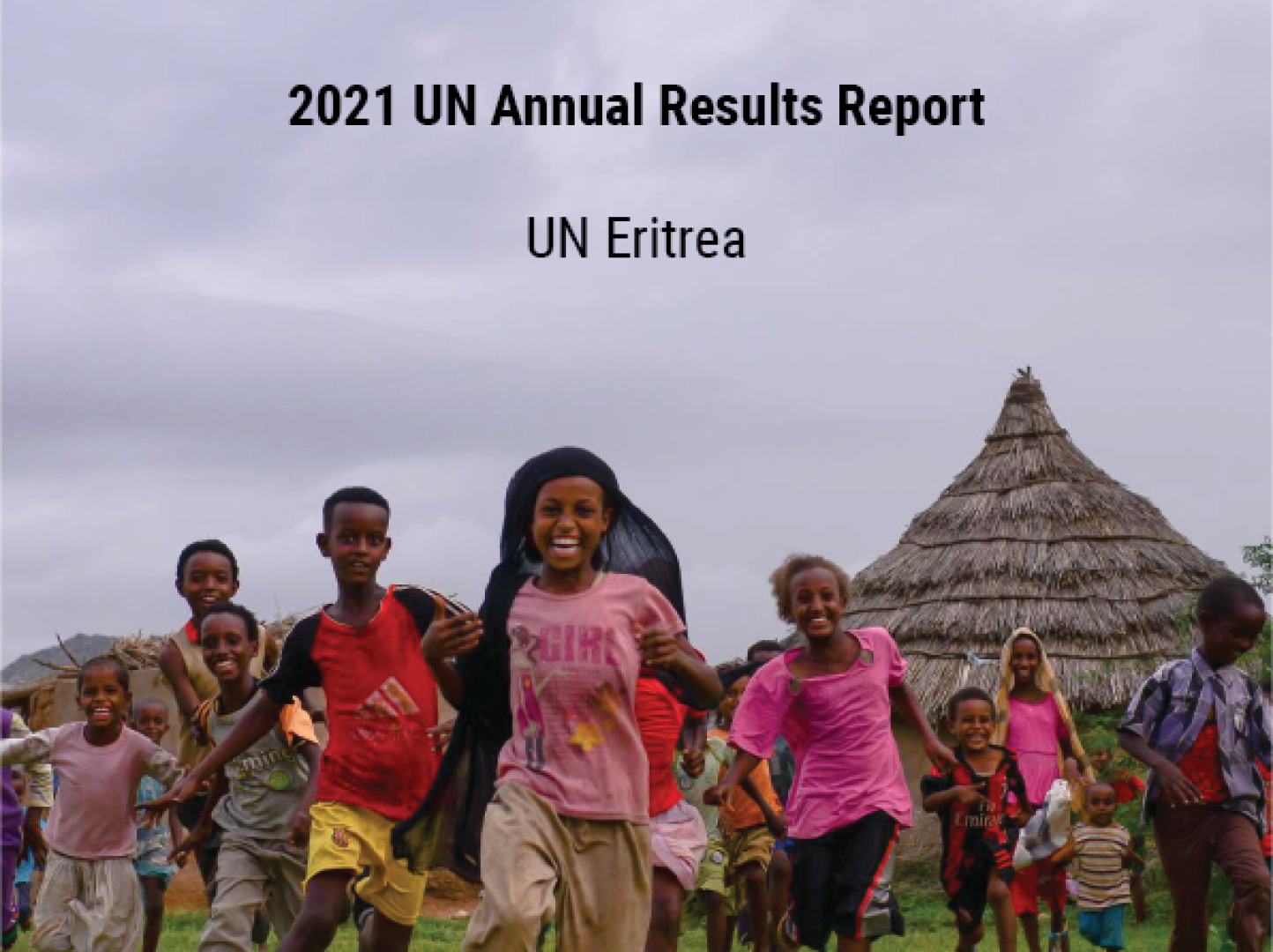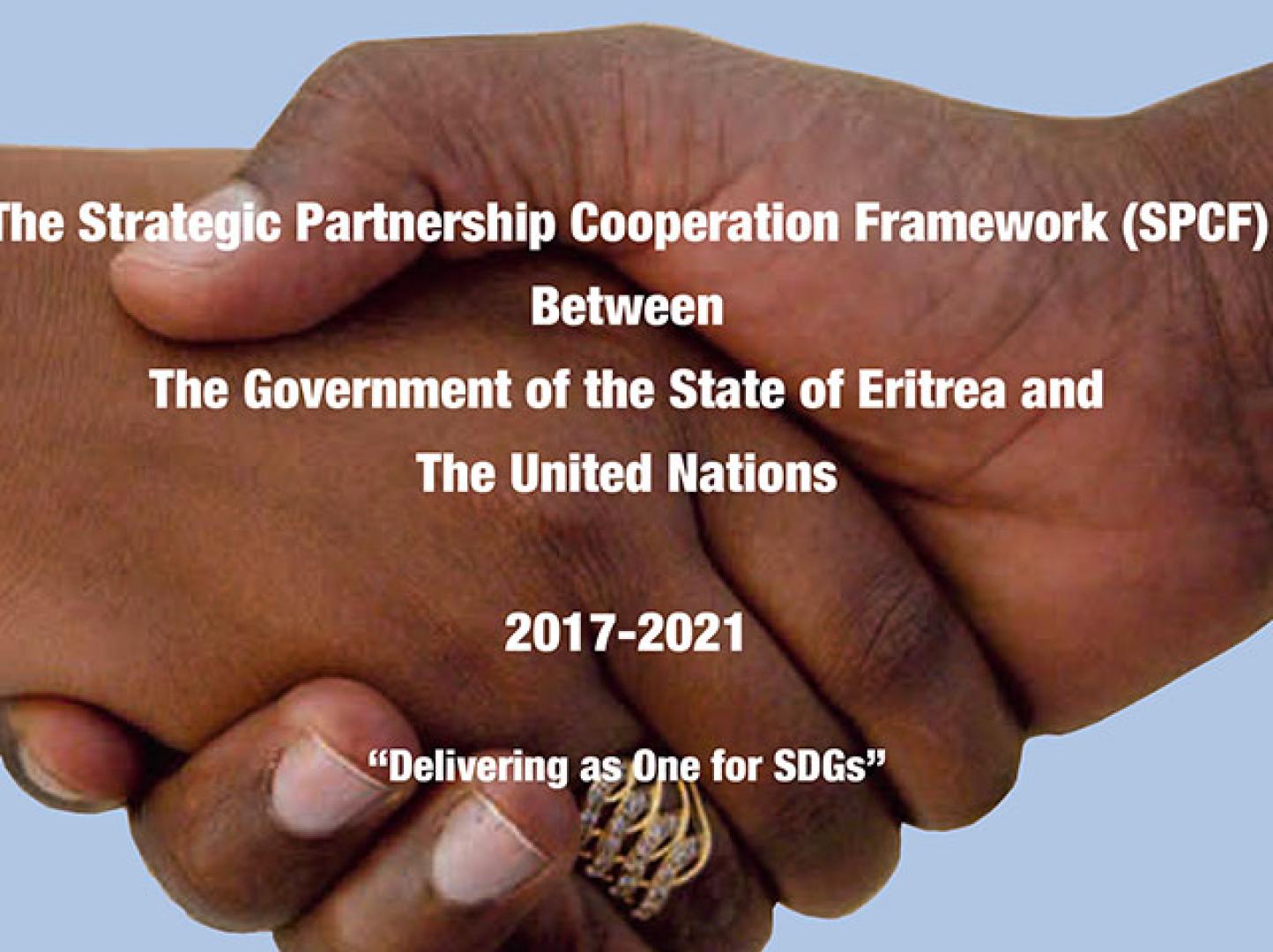Latest
Story
08 June 2023
World Environment Day 2023: Together to find Solutions to Plastic Pollution
Learn more
Story
25 May 2023
Eritrea: Commemoration of World Health Day and WHO’s 75th Anniversary
Learn more
Story
09 February 2023
Fostering aspiration with the new Massawa Workers Vocational Training Center Cisco Academy
Learn more
Latest
The Sustainable Development Goals in Eritrea
The Sustainable Development Goals are a global call to action to end poverty, protect the earth’s environment and climate, and ensure that people everywhere can enjoy peace and prosperity. These are the goals the UN is working on in Eritrea:
Story
08 June 2023
World Environment Day 2023: Together to find Solutions to Plastic Pollution
Eritrea joined millions worldwide in celebrating World Environment Day 2023. This year with an important milestone for the global environmental community and marking 50 years since the 1973 United Nations Conference on the Human Environment, is widely seen as the first international meeting on the environment.
Led by the Ministry of Land, Water, and Environment (MoLWE) and in partnership with UNDP Co in Eritrea, World Environment Day 2023 was celebrated on 5 June 2023 in Asmara, Eritrea.
Celebrated since 2021 by the MoLWE, World Environment Day has become a national platform for public environmental outreach of promoting and raising awareness among the public about the environment and reflecting upon the consequences of environmental mismanagement.
This year, under the theme “Solution to Plastic Pollution”, it was emphasized the importance of plastic pollution control and mitigation to address one of the significant environmental challenges of our time and raise awareness of people on the need to reduce the heavy burden of plastic pollution on people’s health and the threat it poses to the environment and wildlife.
This year’s celebration primarily targeted students with the recognition that they can play a key role in tackling climate change.
A general knowledge competition was organized ahead of World Environment Day, comprising twenty-two students (from 10th grade) selected from schools in the Central region of Eritrea.
Six students made it to the final stage which was broadcasted on National Television. The top-ranked students were awarded during the World Environment Day event that was held on June 5, 2023.
During the Celebration, two young students delivered powerful messages emphasizing the need to act now before it is too late and become actors of change by contributing towards climate change solutions to save the environment.
The main event was attended by the Minister of Land, Water, and Environment, H.E. Mr. Tesfai Ghebreselassie, UN Resident Coordinator in Eritrea, a.i. Mr. Vincent Omuga, UNDP Deputy Resident Representative in Eritrea, Ms. Nashida Sattar, and Eritrea High Governmental officials.
The UNDP Eritrea Deputy Resident Representative, Ms. Nashida Sattar, highlighted in her remarks, "As Eritrea's partners, it is a duty and honor to celebrate all the progressive efforts the country has embarked on. In the early days of environmental consciousness, Eritrea decisively took the lead by prohibiting the use of plastic bags in 2005. Many steps have also been taken to improve the legislative and policy framework, contribute to environmental conservation efforts, and control air and water pollution. The efforts to increase the use of alternative energy have also reduced the pressure on the resources while securing the population's health, particularly women and children."
During the colorful World Environment Day 2023, as part of the MLWE awareness effort, a Presentation on Plastic Pollution was delivered to the audience. The event was also an occasion for awarding six winners of the UNDP Gender and Climate Solutions Award initiative started in April 2023 and six Eritrean public and private companies engaged in plastic waste recycling.
Eritrea has shown commendable commitment by actively working on its environmental policy framework while consistently placing the people at the center of the development agenda. This strategy allows communities, individuals, grassroots, and civil society organizations to lead the way in finding real, inclusive, and sustainable solutions to the conservation and protection of the environment.
UNDP Eritrea Country Office continues to partner with the Ministry of Land, Water and Environment and the Government of Eritrea for initiatives in designing action plans responsive to climate impacts, reducing emissions, contributing to biodiversity conservation, and protecting the livelihoods of society.
Aligned with the 2030 Agenda, UNDP collaborates with the Government of the State of Eritrea to support the country’s long-term development and social equity aspirations through sustainable management of natural resources and environmental protection.
1 of 5
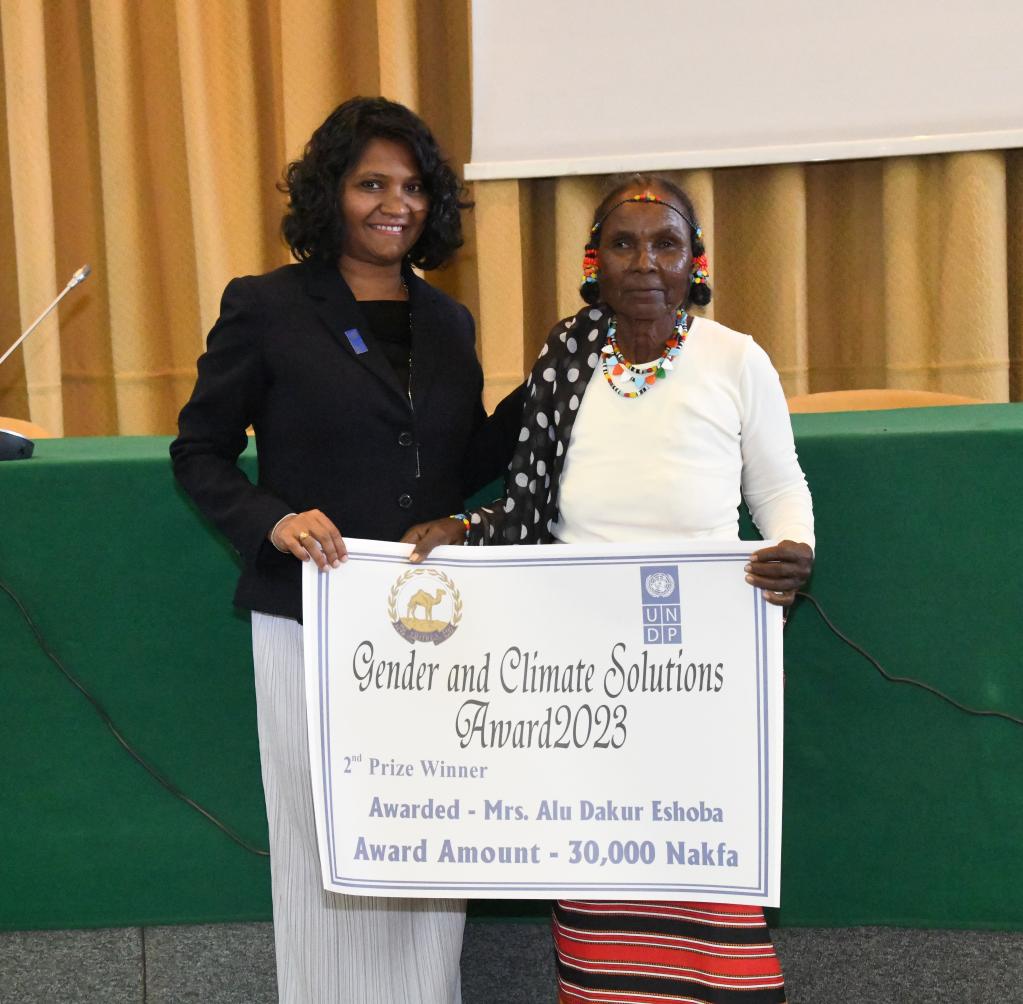
Story
25 May 2023
Eritrea: Commemoration of World Health Day and WHO’s 75th Anniversary
In her official opening speech of the event, Ms. Amina Nurhusein, Minister of Health highlighted Eritrea’s strides in the health sector since independence in 1991. She gave a synopsis of significant progress Eritrea has registered, in controlling and treatment of communicable and non-communicable diseases, as well as vaccination programs and strides to reduce maternal and neonatal death rates.
Minister Amina noted that the achievements registered so far are indicative of encouraging progress Eritrea will make towards attaining UHC and Health related Sustainable Development Goals.
UN Resident Coordinator a.i. Eritrea, Mr. Vincent Omuga pointed out that the large presence of Government Ministers and other senior leaders within the health sector in the event shows the importance Eritrea is attaching to health and well-being of its citizens.
Dr. Martins Ovberedjo, WHO Representative, on his part appreciated the Government of State of Eritrea, development partners and the communities for their commitment and contribution to achieving collective effort to develop the health sector and provide equitable health services to citizens.
The day’s highlight included Fiorina Youth cultural group which brightened the day through their songs and poems of conveying messages of World Health Day.
1 of 5
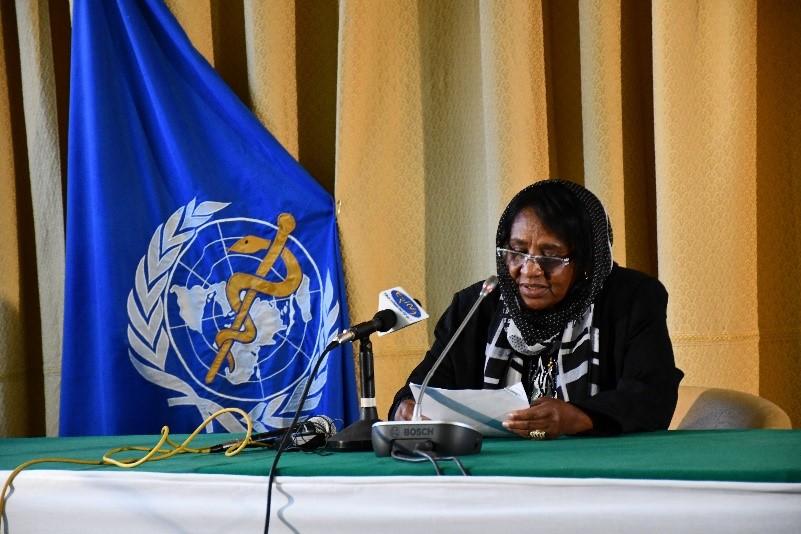
Story
09 February 2023
Fostering aspiration with the new Massawa Workers Vocational Training Center Cisco Academy
In line with its improvement-oriented innovation vision, UNDP was engaged in creating a partnership with Cisco and the National Confederation of Eritrean Workers (NCEW), conforming to its Corporate Social Responsibility to support initiating the timely and valuable Cisco IT and networking certification training that would enhance the connectivity of the country’s development institution free of charge.
This initiative was triggered thanks to the Massawa Workers’ Vocational Training Centre (MWVTC) teachers` exchange visit sponsored by the UNDP to Rwanda and Uganda on 09-12 March 2020, where the value of Cisco training was recognized.
Furthermore, the fostering aspiration of the MWVTC to acquire such an advanced technological skill was realized by enrolling six of its teachers in the CISCO distance learning academy. The UNDP Eritrea office partnered with the NCEW to sponsor the training, launched on July 26th, 2021.
The MWVTC has now been equipped with competent instructors required to establish its own CISCO network academy; therefore, the NCEW-MWVTC re-established the academy under the name of “Massawa Workers Vocational Training Center Cisco Academy.”
The establishment of the Cisco Network academy requires qualified instructors trained and certified in the Cisco networking program.
Therefore, training was arranged for six Instructors of MWVTC and included the following courses:
1. ITE (IT Essentials)
2. CCNA v7 (Cisco Certified Network Assistant)
3. DevNet Associate
4. CyberOps Associate
The six instructors who participated in the CISCO courses have had prior qualifications as engineers graduating from the Mai Nefhi Eritrea Institute of Technology (EIT). Out of the six instructors who took the CISCO CCNA courses, four passed, one deferred the exam for technical reasons, and one failed the certification exam. Nonetheless, the undertaking was generally a successful endeavor.
It is to be recalled that the Massawa Workers Vocational Training Center has seven available workshops, namely Electricity, Electronics, Woodwork, Metal Work, Computer Application, Computer Networking, Heating, Ventilation, Air Conditioning, and Refrigeration (HVAC-R).
The Cisco Network Academy, established, adds value to the Massawa Workers Vocational training by providing the center the opportunity to connect to the world with its workshops.
Furthermore, the Cisco Network Academy excels in creating a new learning platform for Eritrean youth with its capabilities to train people in many different aspects of Computer Technology (Networking) and empower youth to become competent professionals in the global job market.
Aside from partnering with the NCEW in providing CISCO training, UNDP and Cisco also played a vital role in establishing the Massawa Workers Vocational Training Center cisco academy by providing equipment and other necessary facilities that strengthened its capacity.
Dedication and hardworking have been critical components invested so far for the advancement of the Massawa Workers Vocational Training Center.
The management and staff of the MWVTC expressed their deep appreciation for the support and consultations accorded by the UNDP leadership and staff, as well as the relentless contribution and support made by CISCO international marketing director Mr. David Andemichael.
1 of 5
Story
07 February 2023
Ukubu's journey of empowerment - riding through the pandemic
Ukubu Tekele lives with her daughter Frewaini and her two children, Daniel (16) and Yonas (13). This extended family is one of the beneficiaries of the income-generating activities from sub-zoba Assab, the most remote and marginalized zoba in the country. In 2021, this women-headed household received cash transfers in the form of income-generating activities to run a small retail shop. The family had no means of income before receiving the cash transfer that aimed at starting a small family business.
Hence, Freweini has been engaging in some informal income-generating activities, including Daniel and Yonas who worked as street vendors, which in return prohibited them from attending school. During the COVID-19 outbreak, all informal sector activities closed and the family became exposed to extreme economic vulnerability.
However, with the support of community-based social workers, Ukubu’s family was designated for social cash transfer support to start a retail shop, thus her daughter stepped in to support. This one-time grant comprised NKF 10,000 (about USD 666) to initiate the income-generating activity (shop).
Ukubu says, “Together with my family, we received this support during the pandemic. It crucially supported us to ensure our livelihood and enabled my grandchildren to continue their education. They were about to drop out of school due to the challenges. Today, my grandchildren are attending school regularly”. Furthermore, Ukubu adds that she is profiting from the business while her family has access to health services, including improved food consumption in terms of availability and nutrition.
Ukubu thanks the donors for this support who played a crucial role in ensuring her family's survival during the pandemic. Through generous Italian funding, 499 families have been supported with various income-generating activities that are improving the resilience of such vulnerable families.
1 of 5
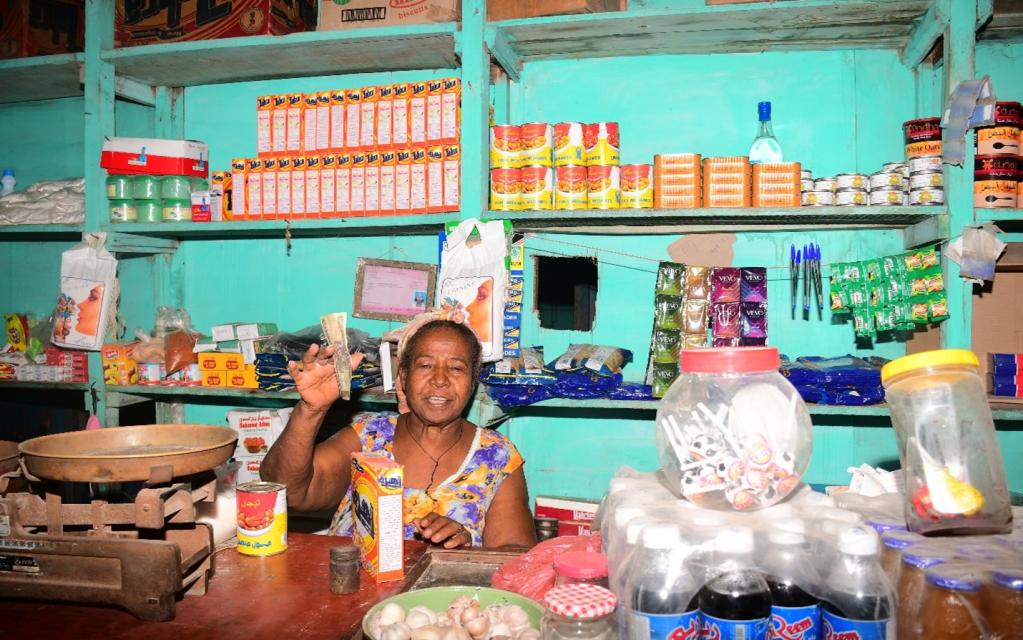
Story
07 February 2023
Eritrea launched Strategic Plan for the Implementation of Reproductive Maternal Neonatal Child and Adolescent Health – Nutrition and Health Aging (RMNCAH - NUT & HAA) 2022-2026
On 13 January 2023 the Ministry of Health, Eritrea, launched the Strategic Plan for the Implementation of Reproductive Maternal Neonatal Child and Adolescent Health – Nutrition and Health Aging (RMNCAH - NUT & HAA) 2022-2026. The launch ceremony took place in the presence of Honourable Minister of Health, Mrs. Amina Nurhussien s at the National Confederation of Eritrean Workers. The Ministry of Health led the development of the strategic plan and the UN Agencies : WHO, UNICEF, UNFPA and UNAIDS jointly supported the process both technically and financially.
The RMNCAH & HA Strategic Plan 2022–2026 aims to guide the implementation of high-impact evidence-based interventions to improve maternal, newborn, child, adolescent and older people outcomes towards attainment of the health-related Sustainable Development Goals (SDGs) 3 (Good health and well-being) and SDG 5 (Gender equality). Ensuring universal access to comprehensive, high-impact, quality, cost-effective and culturally sensitive reproductive, maternal, newborn, child and adolescent health and healthy ageing services to all Eritreans along the continuum of care in an equitable and efficient manner is the main mission of this document.
The Ministry of Health called for accelerated action and increased investments in line with the costed strategic plan to meet the SDG targets by 2030. This will aid accelerated progress towards ending all preventable deaths of women, newborns, children and realization of the health and wellbeing of adolescents and elders in Eritrea.
1 of 5
Press Release
04 May 2022
OHCHR Regional Representative and Director of UNOHCHR-EARO begins three-day working tour of Eritrea
ASMARA, Eritrea – The Regional Representative, Office of the High Commissioner for Human Rights, East Africa Regional Office (OHCHR-EARO), and Representative to African Union, Mr. Marcel C. Akpovo has begun a three-day official visit of the State of Eritrea. He is accompanied by the Deputy Regional Director Ms. Maymuchka Lauriston and Mr. Anganile Mwenifumbo, Human Rights Officer of UNOHCHR-Geneva.
During the visit, the delegation will hold high-level technical talks with Senior Government Officials and UN Development Partners, on strengthening the justice sector reforms.
This visit comes four months after the high-level visit by Regional Directors in January 2022, during which, the UN Sustainable Development Cooperation Framework was launched.
#Ends
Notes to Editors
This Press Release has been drafted joint by the United Nations Development System in Eritrea and the UNOHCHR-EARO. The UN in Eritrea is committed to working in close partnership with the Government of the State of Eritrea and Development Partners to contribute to the attainment of the Sustainable Development Goals by 2030.
If you would like to keep up to date with news and information about this high-level visit and the work of the UN in Eritrea, you can follow the UN in Eritrea Twitter account @UNinEritrea, @OHCHR_EARO and that of the Resident Coordinator in Eritrea @AmaSande
Media Contacts
William Silamawia, Communications Officer
UNDP and Resident Coordinator’s Office
William.silamawia@undp.org
Paa Kwesi A. Cudjoe
Human Rights Specialist
OHCHR Regional Office for East Africa Paa.cudjoe@un.org
Human Rights Specialist
OHCHR Regional Office for East Africa Paa.cudjoe@un.org
1 of 4
Press Release
23 April 2022
UNHCR Regional Delegation concludes two-day working tour of Eritrea
ASMARA, Eritrea – UNHCR’s Regional Director for the East and Horn of Africa and the Great Lakes (EHAGL), Ms. Clementine Nkweta-Salami has concluded her two-day official visit to the State of Eritrea. She was accompanied during the mission by the Head of the Protection Services for the EHAGL Regional Bureau, Mr Charles Mballa.
During the visit, the UNHCR delegation held high-level talks with Eritrea’s Minister of Foreign Affairs H.E. Osman Saleh Mohammed, Minister of Information Yemane Gebremeskel and the Head of Political Affairs and Presidential Adviser, Mr. Yemane Gebreab. They also had the opportunity to meet with development partners in Eritrea and the UN Country Team.
“I welcome and appreciate the cordial and frank discussions held throughout our visit. I look forward to continuing the dialogue with the Government of the State of Eritrea on various issues of mutual concern,” said Nkweta-Salami.
ENDS
Notes to Editors
The United Nations Development System in Eritrea is committed to working in close partnership with the Government of the State of Eritrea and Development Partners to contribute to the attainment of the Sustainable Development Goals by 2030.
If you would like to keep up to date with news and information about this high-level visit and the work of the UN in Eritrea, you can follow the UN in Eritrea Twitter account @UNinEritrea and that of the Resident Coordinator in Eritrea @AmaSande
Media Contacts
William Silamawia, Communications Officer
UNDP and Resident Coordinator’s Office
William.silamawia@undp.org
Tina Ghelli
Senior Communications Advisor
UNHCR
ghelli@unhcr.org
1 of 4
Press Release
20 April 2022
UNHCR Regional Director begins two-day working tour of Eritrea
20 April 2022
ASMARA, Eritrea – The UNHCR Regional Director for the East and Horn of Africa and the Great Lakes (EHAGL) Ms. Awu Nkweta Salami has begun a two-day official visit of the State of Eritrea. She is accompanied by the Head of the Protection Services for the EHAGL Mr. Charles Mballa.
During the two-day visit, the UNHCR delegation will hold high-level talks with Senior Government Officials and UN Development Partners.
This visit comes three months after the high-level visit by Regional Directors who were led by the Regional Director for the UN Development Coordination Office, Mr. Yacoub Ali El-Hillo, during which, the Cooperation Framework was launched.
Speaking after her arrival, head of delegation Ms. Nkweta said this visit helps to build on dialogue on various issues of mutual interest for both Government and the United Nations.
#Ends
Notes to Editors
The United Nations Development System in Eritrea is committed to working in close partnership with the Government of the State of Eritrea and Development Partners to contribute to the attainment of the Sustainable Development Goals by 2030.
If you would like to keep up to date with news and information about this high-level visit and the work of the UN in Eritrea, you can follow the UN in Eritrea Twitter account @UNinEritrea and that of the Resident Coordinator in Eritrea @AmaSande
Media Contacts
William Silamawia, Communications Officer
UNDP and Resident Coordinator’s Office
William.silamawia@undp.org
Tina Ghelli
Senior Communications Advisor
UNHCR
ghelli@unhcr.org
1 of 4
Press Release
31 January 2022
A new era of cooperation to kick off as UN Regional Directors conclude their mission to Eritrea
ASMARA, Eritrea – The Government of Eritrea and the United Nations have hailed a new era of strategic partnership that will advance their shared aspirations for the people of Eritrea, as a high-level delegation of UN Regional Directors concluded its week-long visit. 24 senior officials from UN regional offices across Africa, including six Regional Directors and two Deputy Regional Directors, participated in a series of high-level engagements between 24 and 28 January.
Speaking on behalf of the delegation on 25 January at the launch of the new Eritrea-UN Sustainable Development Cooperation Framework (2022 – 2026), Yacoub El-Hilo, Regional Director for Africa of the UN Development Coordination Office, extended the UN’s appreciation to the Government of the State of Eritrea for its active leadership throughout the development of the new framework which adopted a whole-of-government approach, leading to a robust document that reflects both Government priorities and the SDGs. “It is our hope that we are ushering in a new era of an effective and efficient strategic partnership between the Government of Eritrea and the UN,” said Mr. El-Hilo.
Speaking during the launch of the Cooperation Framework on Tuesday, Minister of Finance and National Development Mr. Georgis Teklemichael shared on the historical context of Eritrea which has informed its development trajectory.
During the five-day mission, UN officials discussed a wide range of issues with government and development partners. These included fully utilizing the UN’s resources to ensure optimal delivery in the new cooperation framework’s priority areas; COVID-19 vaccinations; regional dynamics in the Horn of Africa and the role Eritrea could play in fostering peace and security; regional trade integration and Eritrea’s perspectives on the African Continental Free Trade Agreement; human rights issues; climate action; and data for development.
On 27 January, the delegation traveled to southern Eritrea, where they met with with regional government partners and communities. They visited key institutions such as the National Agricultural Research Institute, the Mendefera Hospital (which hosts the national fistula treatment centre), the National Union of Eritrean Youth and Students (NUEYS Zoba Debub branch); the Dubarwa and Areza Community Health Centres, Areza solar photovoltaic grid, the Azeib Dairy Farm, Logo and Misilam Dams.
Members of the visiting mission were unanimous in their view that they had gained a better understanding of Eritrea’s context, its unique development perspectives and Eritrea’s expectations of a re-invigorated partnership with the UN in this new era of cooperation. The delegation members said they were better placed to be “ambassadors” of Eritrea’s development achievements. The government, in turn, agreed to address resource absorption issues and to scale up the implementation of programmes in the new cooperation framework era in line with the call for accelerated progress in the Decade of Action with eight years left to achieve the SDGs.
This high-level visit builds on an earlier one by the Special Envoy for the Horn of Africa last month (following an exchange of letters between H. E President Isaias Afwerki and the United Nations Secretary General H.E António Guterres) and it signals a reinvigoration of the partnership between the Government of the State of Eritrea and the United Nations.
###
Notes for correspondents
The high-level mission to Eritrea, led by the UN Development Coordination Office’s Regional Director for Africa, included five other Regional Directors representing the Office of the UN High Commissioner for Human Rights, UN Economic Commission for Africa, UN Office on Drugs and Crime, UN Population Fund and the World Food Programme. The Deputy Regional Directors from the UN High Commissioner for Refugees and UN Office on Drugs and Crime are also among the participants. Other Regional Directors sent their senior representatives.
The new UN Sustainable Development Cooperation Framework comprises of four outcomes:
Outcome 1: By 2026, more people have benefited from equitable access to and use of inclusive high quality essential social services.
Outcome 2: By 2026, Eritrea’s public sector institutions are more accountable and efficient, and more people enjoy the right to development.
Outcome 3: By 2026, people in Eritrea, especially the disadvantaged population, have increased livelihoods as economic growth becomes more inclusive and diversified
Outcome 4: By 2026, people in Eritrea have benefited from climate resilient, sustainable environment and natural resources management.
Media Contacts
William Silamawia, Communications and Knowledge Management Officer
UNDP/Resident Coordinator Office in Eritrea
william.silamawia@undp.org
Daisy Diamante Leoncio, Regional Communication Adviser
United Nations Population Fund – Johannesburg
leoncio@unfpa.org
Hiroyuki Saito, Regional Communications Officer
Regional Office for Africa, UN Development Coordination Office – Addis Ababa
saitoh@un.org
1 of 4
Latest Resources
1 / 6
1 / 6

